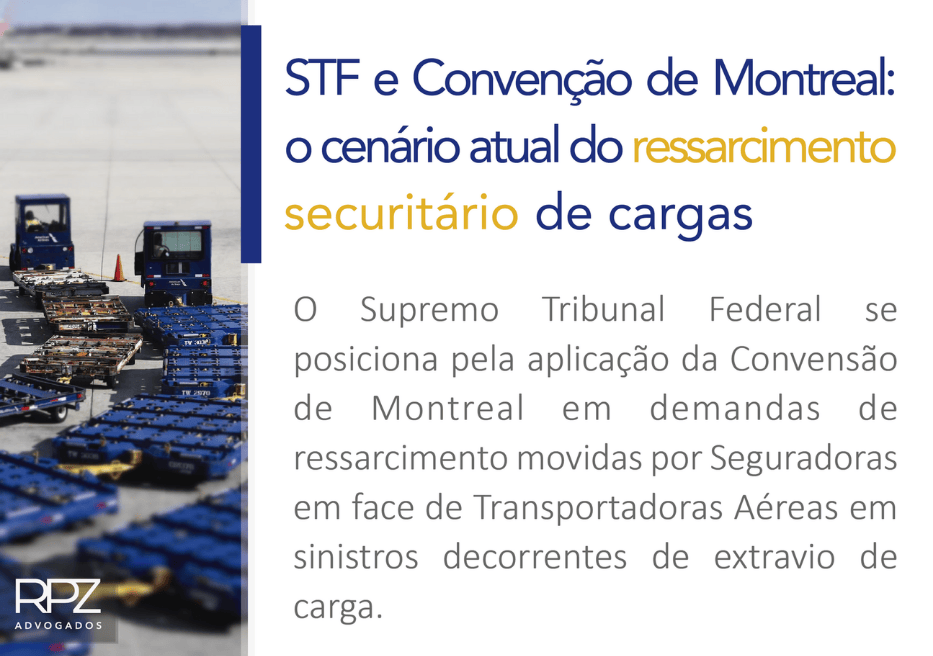Thank you! Your submission has been received!
Oops! Something went wrong while submitting the form.
Thank you! Your submission has been received!
Oops! Something went wrong while submitting the form.
Articles

-min.avif)
The discussion regarding the extent of the Insurance Company's right of return in claims resulting from the loss of cargo in international air transport is a controversial and relevant topic, since it may limit the amount returned. Thus, on the one hand, the insurance market supports the application of the Civil Code, while on the other, air carriers claim that the valid legal instrument is the Montreal Convention (“Convention”), ratified by Brazil and enacted by Decree 5,910/2006.
In summary, the Civil Code and, when applicable, the Consumer Protection Code, provides for the principle of full redress in art. 944 of the Civil Code: “compensation is measured by the extent of the damage.”. Thus, in the event of a loss or loss of the merchandise, it will be up to the transporter, who is objectively responsible (that is, regardless of intent and guilt), to fully compensate the one whose property was lost. Based on the right to receive full compensation by the owner of the merchandise, the Insurer subrogates itself and is entitled to the receipt of the same amount, plus legal consectaries for monetary adjustment and interest.
In turn, the Convention is more advantageous for air carriers, since it limits the amount of compensation in the event of destruction, loss, damage, or delay to an amount of 17 Special Drawing Rights per kilogram transported (which currently corresponds to the amount of R$ 131.41/kg); this limitation will only be overcome if the shipper has made a special declaration of the value of the cargo and paid, if appropriate, an additional amount for transportation (art. 22 of the Convention). But that's not all, the statute of limitations for claiming any loss from an air carrier is 02 (two) years (art. 35 of the Convention), unlike the usual 03 (three) years that govern many legal relationships (art. 206, paragraph 3, item V of the Civil Code).
Thus, using the precedents RE 636331 and the ARE 766,618 of the Supreme Federal Court (“STF”), air carriers tried to take advantage of extending the applicability of the signed thesis to all situations of international air transport, including cargo, which, in turn, encompasses the compensation actions proposed by the Insurers subrogated by the rights and duties of their Insured Persons.
It is valid to make a parenthesis to explain the precedents mentioned above, dated 25/05/2017, in which the STF assessed incidents related to international passenger air transport, when it was decided, by a majority of votes, the thesis in general repercussion No. 210 that “in accordance with art. 178 of the Constitution of the Republic, international rules and treaties limiting the liability of passenger air carriers, especially the Warsaw and Montreal Conventions, take precedence over the Consumer Protection Code”.
Faced with this impasse, it was not long before the proposed controversy between Insurers and air carriers was considered by the STF, which has already expressed itself, on two occasions, to the effect that demands related to the transportation of international cargo by air will also be resolved by the Convention.
In Extraordinary Appeal No. 1,241,089 (RE 1,241,089) filed by TAP - Transportes Aéreos Portugueses against the judgment of the 37th Chamber of Law of the São Paulo State Court of Justice - which had found that any limitation on the amount of compensation was unreasonable - Min. Rapporteur Roberto Barroso upheld the “appeal to determine the original instances to reassess the fact, taking into account that the international law governing the matter must prevail for the possible conviction of an international airline for moral and material damages”.
In another appeal, in Extraordinary Appeal No. 1242964 filed by LAN Airlines S/A against the judgment of the São Paulo Court of Justice - which recognized the absence of compensation limitation against the insurance company's claim for compensation - Min. Rapporteur Luiz Fux understood that “there has been a declaration of the value of the cargo transported, a circumstance that, under the terms of the said Conventions, precludes the limitation of the carrier's liability”, there is no need to mention the application of a “ceiling” for compensation, and this must therefore be full and in the exact amount spent by the Insurance Company, plus the legal consectaries.
Thus, it is not necessary to conclude that the STF's understanding is that all claims involving international air transport should be resolved in the light of the Convention, as it is a more specific rule on the subject.
This situation has the potential to impact air cargo transportation policies if this understanding is established in the STF and, therefore, in the lower courts. Therefore, it is recommended that the declaration of the amount of the cargo be a mandatory document to be carried out by the Insured, under penalty of possibly losing and/or limiting the rights of the Insurer in a regressive situation.
In this regard, it is recommended that Insurers instruct their respective insured to declare the value of the cargo when it is delivered to the carrier, if it is higher than the limit proposed by the Convention, otherwise they will not obtain the desired compensation success.
This is because, according to art. 22 of the Convention, the declaration of the value of the cargo is the only way to avoid the limit of 17 Special Drawing Rights per kilogram in the event of an accident, and is therefore a condition Sine qua non so that the right to compensation can be fully exercised by the Insurance Company.
In conclusion, the risk underwriting and claims regulation areas must be aware of this peculiarity imposed by the Convention to protect the rights of the Insurer to fully reimburse itself.
In case of doubts, RPZ Advogados has a team specialized in aviation and compensation matters.